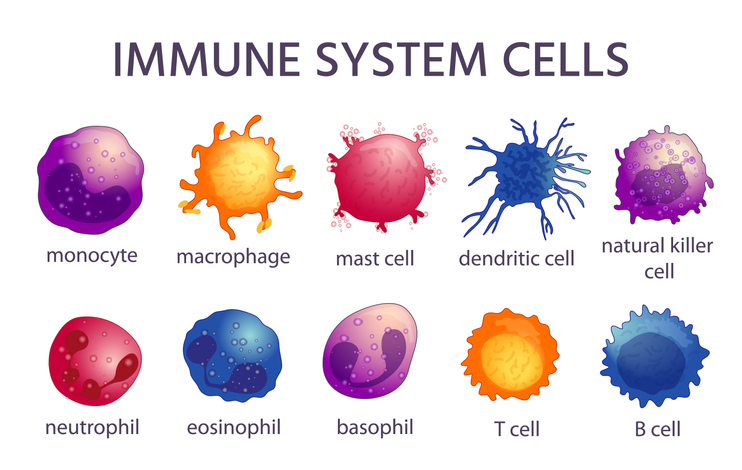What You Need to Know About Tattoos and the Immune System

By Joy Stephenson-Laws, JD, Founder
Summer is a popular time for tattoos. People are at the beach, wearing less clothing in general due to the warmer weather. What better time to show off a new tattoo? I don’t have any tattoos nor have I ever had a desire to get one, but I am still interested in how this body art may affect the internal body.
Apparently, studies have suggested that tattoos have the potential to be both beneficial and detrimental to the immune system.
The immune system is made up of various organs, cells and proteins. For example, the liver, tonsils, adenoids, appendix, spleen, thymus, bone marrow and white blood cells are usually considered part of the immune system. In order to understand a tattoo’s potential effect on the immune system, you need to have a basic understanding of what a macrophage is.

A macrophage is a type of white blood cell. The name of this white blood cell actually means “big eater” in Greek, which makes perfect sense once you understand how a macrophage functions.
“They travel around the body, gobbling up bacteria the way that Pac-Man dealt with those pesky ghosts,” according to a report from BBC’s ScienceFocus, which I think sums it up easily.
Macrophages are found in almost all tissues in the human body.
“Generally, macrophages ingest and degrade dead cells, debris, tumor cells, and foreign materials. They promote homeostasis by responding to internal and external changes within the body…,” according to a study published by the National Institutes of Health (NIH).
The body responds to getting a tattoo as a trauma, because it is. Needles are poking through multiple layers of skin (which is the body’s largest organ and first line of defense) and essentially causing a wound. The immune system also registers the ink from a tattoo as a foreign invader. So when this ink is introduced, the macrophages (those big eaters) start doing their job and ingest the ink. From there, the macrophages try to break down the ink with enzymes so that it can be passed through the body’s lymphatic system.
“However, large tattoo ink droplets are not broken down by these enzymes. Once taken in by a macrophage, the ink molecules are stuck there. It is this trapped ink that you see when admiring your or your friend’s latest tattoo,” reports Amgen Biotech Experience.
“But like nearly all cells within the human body, macrophages don’t live forever. Scientists have found that when a macrophage dies (white blood cells last for a few days to just over a week), the ink is once again released into the dermis. But almost immediately, a fresh new macrophage arrives to destroy the freed ink, and once again, the ink is trapped. And this process continues over time, which keeps the tattoo in place.”
This process is also the reason why tattoos are so difficult to remove.
So is this game of trap and release beneficial to the body's immune system?
Unfortunately, I cannot give you a definitive answer.
“Scientists aren’t yet sure if the macrophages’ inky clog-up has consequences,” according to a report from The Atlantic that references an immunologist.
“Stopped-up macrophages might be less able to take in more dangerous substances, such as pathogens. One study published last year found that tattoo pigment might alter the proteins they produce and the signals they send to other cells. All of that might mean nothing—or that the cell starts over- or underreacting to foreign material, potentially putting the immune system at a disadvantage if a new tattoo ends up inflamed, infected, or triggering allergies.”
On the other hand, some research has shown that people with more tattoos have higher levels of immune molecules. This, however, does not necessarily mean that this tattooed individual will for sure have a better functioning immune system compared to someone free of tattoos.

My take on it is this. Tattoos are an extremely personal decision, and you have to weigh the potential pros and cons and how they relate to you as an individual. If you are someone who already has a compromised immune system, I would not suggest getting a tattoo. I also think it is important to really understand that if you agree to a tattoo, you are agreeing to a foreign object being in your body. This is not necessarily a bad thing, but I think it is important to have that understanding so that you can make the best decision for you.
Support your immune system.
I highly recommend checking out the pH blog Be Proactive About Your Immune System, which lists 10 specific ways you can keep your immune system in top shape.
I would also strongly recommend considering cryotherapy. The theory behind cryotherapy is that freezing temperature experienced by your body sends signals to the brain which in turn triggers an emergency or survival mode. This causes the body to constrict the blood flow in the outer layers and send the blood supply to the innermost vital organs. While in this “emergency survival mode,” all the body’s resources are activated. The body’s ability to self heal is enhanced because your blood is being enriched with additional oxygen, hormones, enzymes and nutrients - all of which are needed to survive under the extreme emergency created by the cryotherapy. Once you leave the cold environment, the newly enriched and less-toxic blood is flushed back into the rest of the body. One of the benefits of this practice is an improved immune response and less inflammation.
Finally, make sure you are getting plenty of vitamin C if you plan on getting a tattoo this summer. This nutrient is known for promoting faster wound healing. And, of course, get your tattoo at a licensed, reputable and experienced establishment. Do not be afraid to inquire about santization practices.
Enjoy your healthy life!
Disclaimer: This article is not intended to provide medical advice. Please consult with your doctor or another competent healthcare practitioner to get specific medical advice for your situation.
The pH professional health care team includes recognized experts from a variety of health care and related disciplines, including physicians, attorneys, nutritionists, nurses, and certified fitness instructors. This team also includes the members of the pH Medical Advisory Board, which constantly monitors all pH programs, products, and services. To learn more about the pH Medical Advisory Board, click here.







